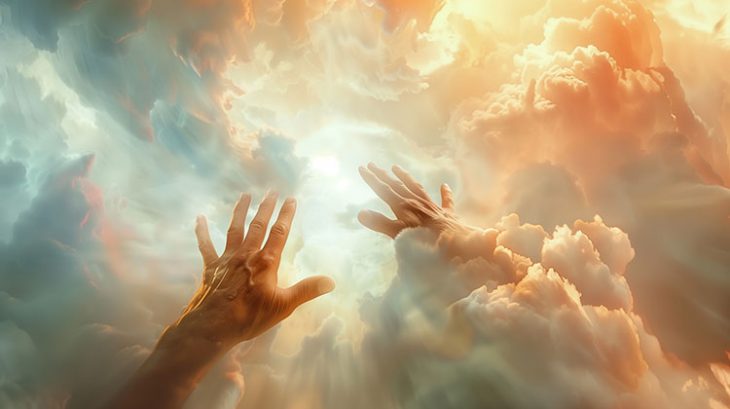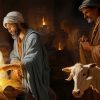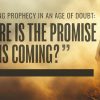[Note: Our guest contributing author, Lee Brainard of Soothkeep, is a recognized expert in the Greek, Aramaic, and Hebrew languages. His latest book, Recent Pre-Trib Findings in the Early Church Fathers, details their expectation of the Pre-Tribulational Rapture.]
Soundbite Theology
The Pretribulation Rapture is regularly attacked in our day. Men rail against it in books and magazine articles, on social media, in radio programs and podcasts, in YouTube videos and TV shows. We hear the same accusations over and over again. “No one taught a Pre-Trib Rapture prior to J.N. Darby.” “No early church father taught a Pre-Trib Rapture.” “Nobody learns the Pre-Trib Rapture from the Bible alone.” “The only reason men believe in the Pre-Trib Rapture is because somebody taught it to them.” These accusations all boil down to the same charge—the Pre-Trib Rapture is a recent innovation that can’t be found in the Bible.
But nobody should be intimidated by these attacks. They are not based on an honest and thorough investigation of the Bible and history. They are based on racy, anti-Pre-Trib narratives which require men to ignore most of the evidence and encourage them to fight with soundbites rather than real arguments from the Bible and history.
Robust Investigation
The truth is, when men engage in robust investigation of the Bible and Early Church History, they discover that the anti-Pre-Trib soundbite theology is wrong. It doesn’t have a leg to stand on.
When we make a robust examination of the Bible’s teaching on the Last Days—honestly and carefully weighing all the evidence—we discover two related points.
One, the Tribulation is the final seven years of the seventy weeks of years (the 490 years) that the Lord has determined upon Israel to fix her unbelief and reconcile her to himself (Daniel 9:24-27). This time is also called the Seventieth Week and the Time of Jacob’s Trouble (Jeremiah. 30:7). God’s purpose in the seven years of Tribulation is to give Israel a second chance to receive the Messiah that she rejected.
Two, the Church will be removed from this planet before the Tribulation begins (Rev. 3:10; 4-5; 2 Thess. 2:1-3; 1 Thess. 4-5). Her removal is not because she can’t see tribulation. It is because the Last Days Tribulation transcends normal tribulation. It is judgment upon the world in general and Israel in particular. God is determined to break the spell of Israel’s unbelief.
When we make a robust examination of the prophetic views of the Early Church Fathers—studying their works carefully and thoroughly—we discover that many of them taught a Rapture before the Tribulation. The earliest fathers that addressed prophecy at any length were Pre-Trib, and the Pre-Trib testimony survived long after the rise of Replacement Theology.
The Blessed Hope in the early Church is the focus of this article. I will present information from several Early Fathers who clearly believed in a Pre-Trib Rapture.
Irenaeus
Irenaeus lived and wrote in the second century. The work he is best known for is his Against Heresies, which addresses many of the errors of his day. This work contains many observations which reveal his prophetic views, especially in book 5. His testimony is especially significant because he claimed that he received his prophetic instruction from aged men who had sat at the feet of the Apostles. He knew men who knew the Apostles.
Now anti-Pretribbers love to quote Against Heresies 5.26.1,
“The ten horns … are ten kings, who … shall receive power as if kings one hour with the beast … and they shall lay Babylon waste, and burn her with fire, and shall give their kingdom to the beast, and put the Church to flight.”
They triumphantly gloat that this is proof that Irenaeus believed that the Church would go through the Tribulation.
The problem is, this is a wrong conclusion based on superficial research. Irenaeus is a classic example that men need to carefully and fully study a subject before they frame and articulate a position. If men study what Irenaeus taught on Israel and the Church, they will discover that he believed there were two churches (two synagogues): the elder and the younger (Against Heresies 4:31.1-2). The elder refers to Israel and the younger refers to the Church. They will also discover that he distinguished between God’s current program with the New Testament seed of Abraham and God’s future program with the Old Testament seed of Abraham, defending this future return to Israel by citing the promise in Jeremiah that God would gather Israel from all the nations where they had been scattered (Against Heresies 5.34.1).
Once you understand Irenaeus’ distinction between the Old Testament congregation of God’s people (Israel) and the New Testament Church, then you realize that his passage regarding the Church in the Tribulation does not prove that he believed that the New Testament Church would go through the Tribulation. When you take all of his testimony into consideration, you realize that he was talking about the Old Testament “Church” (Israel) being in the Tribulation.
Further, Irenaeus taught a Pre-Tribulation Rapture. In Against Heresies 5.29.1 we read,
“And therefore in the end when the Church is suddenly caught up from this, it is said, ‘There shall be tribulation such as has not been since the beginning, neither shall be.’ For this is the last contest of the righteous, in which, when they overcome, they are crowned with incorruption.”
Notice that the circumstantial clause “when the Church is suddenly caught up” is followed by the main verb clause “there shall be tribulation.” The future tense here implies that the New Testament Church will be removed prior to the start of the Tribulation. The Old Testament saints will enter the Tribulation and will endure the last contest of the righteous.
Another Pre-Trib Rapture testimony is found in Against Heresies 5.5.1.
“For Enoch, when he pleased God, was translated in the same body in which he did please Him, thus pointing out by anticipation the translation of the just. … Wherefore also the elders who were disciples of the apostles tell us that those who are translated are translated to … paradise … in which place also Paul the apostle, when he was caught up, heard unspeakable words … and that those who have been translated shall remain there until the consummation [the end], as a prelude to incorruptibility.”
Notice that the Church will be translated to the Third Heaven prior to the fall of judgment even as Enoch was translated prior to the fall of judgment, and they will stay there until the end, that is, until the day the Lord descends from Heaven in judgment.
These two passages make it clear that Irenaeus taught a Pre-Trib Rapture. His testimony is especially significant because, as noted earlier, he claimed that he got his teaching on prophecy from the aged men who sat at the feet of the Apostles themselves. He is, in essence, claiming that the Apostles taught a Pre-Trib Rapture to men like Polycarp, and men like Polycarp taught Irenaeus.
Eusebius
Eusebius was born around AD 260, rose to prominence in the early 300s, and became bishop of Caesarea Maritima around AD 314. He is best known for his Ecclesiastical History, but he penned many other works, some extant, some lost. Despite the fact that he was amillennial and spiritualized many of the prophecies in the Old Testament, yet he still held a Pre-Trib Rapture based on the teaching of the New Testament. Following are two examples:
1. “Fragments in Luke, on Luke 17:26, “
“the cataclysm of the destruction of the ungodly shall not happen before those men who are found of God at that time are gathered into the ark and saved according to the pattern of Noah … all the righteous and godly are to be separated from the ungodly and gathered into the heavenly ark of God.”
Notice that in his estimation, the judgment upon the world at the end of the age does not fall until after the Church saints are in the heavenly ark. This is clearly a Pre-Trib Rapture.
2. “Fragments in Daniel,” “fragment E“,
“The apostle Paul was moved to write in this manner on the Second Coming of Christ, ‘For the Lord himself shall descend from heaven with a command, with the call of the archangel, and with the trumpet of God,’ and so forth. But the same apostle also connects with this prophecy, in order, the endtimes coming and depravity of the Antichrist and after this the glorious appearing of our Saviour.”
Notice the order of events that he sets forth here: the Rapture, the coming of the Antichrist, the glorious appearing of the Lord. Like many Pre-Tribulationists today, he regarded the Rapture as an aspect of the Second Coming.
These two passages should make it abundantly clear to any unbiased reader that Eusebius believed in and taught a Pretribulation Rapture.
Ephraim the Syrian
Ephraim lived and wrote in the fourth century. He was the most significant father among the Syriac-speaking branch of the Eastern church. His writings were very popular, and many of them were translated into Greek. Despite the fact that he was amillennial, he still held to the Pre-Trib Rapture. The following passages are among the clearest statements of the Pre-Trib Rapture in the Early Church Fathers.
In “Sermon on Repentance, Judgment, and Separation of the Soul” (239), he wrote, “For the elect shall be gathered PRIOR TO the Tribulation, so they shall not see the confusion and the Great Tribulation coming upon the unrighteous world.” It would be hard to state a Pretribulation Rapture more clearly than “prior to the Tribulation.”
“On the Fathers who Have Completed Their Course” (15),
“When we see the saints in glory flying off in light in the clouds of the air to meet Christ, the King of Glory, but see ourselves in the Great Tribulation, who shall be able to bear that shame and reproach?”
Ephraim here, with a display of ascetic humility, contrasts himself with the truly godly who will go up in the Rapture. But his false humility doesn’t void his testimony for a Pre-Trib Rapture. Moreover, this passage demonstrates his belief that some professing Christians will miss the Rapture.
“Sermon on the Advent, the End, and the Antichrist” (116),
“For if anyone has tears and compunction, let him pray the Lord that we might be delivered from the Tribulation which is about to come upon the Earth, that he might not see it at all, nor the beast himself, nor even hear of its terrors.”
Here Ephraim presents a deliverance from the Tribulation that puts the saints at such a distance from it that they won’t see it or the Antichrist, in fact, they won’t even hear about it. We know from the Bible that the hour of trial is going to engulf the entire planet. Therefore, the only way to obtain this kind of deliverance, not seeing or hearing the Tribulation at all, is to be physically removed from the planet.
Conclusion
The examples presented here should convince any unprejudiced man that there were men in the Early Church who held and taught the Pre-Trib Rapture. The Blessed Hope was alive and well in the Early Church. So there is no need to fret over soundbites like “no Early Father taught a Pre-Trib Rapture” and “the Pre-Trib Rapture teaching started with Darby.” Both of these claims are demolished by the testimonies given above.








Dr. Nathan Jones, I attended Duke Divinity School from 1989-1992. Any professors that I sat under, when the topic of the rapture of the church and especially the pretribulation rapture of the church, discounted it declaring that the teaching was non-existent before Darby. Comments concerning Scofield promoting his Darbyistic teaching via the Scofield Bible Study were interesting. As President of Southwestern Theological Seminary in Texas, the Scofield Bible became manditory for each student. This caused the teaching and preaching of dispensational theology, which includes Pre-Trib theology, in pulpits and on airwaves throughout the United States. Denominations that did not promote the Schofield Bible did not experience the promotion of dispensational theology. So, congregants in many mainline denominations had not heard that teaching and when they did wondered why they hadn’t heard it. Many thanks for your ministry. My wife and I read every post you send and we watch the programs as well. Blessings in Christ.
Ty, thank you for those encouraging words! So good to hear that Lamb & Lion Ministries is a blessing to you and your wife.
Here’s my take on the misinformed “too new to be true” argument – http://christinprophecy.org/?sermons=the-inbox-5-what-are-some-misconceptions-about-the-rapture. Here’s a 3-part series by Dr. Reagan on the subject at https://christinprophecyblog.org/2022/03/is-the-pre-trib-rapture-too-new-to-be-true-part-1-of-3/. You’ll also want to read the excellent research of the Early Church Fathers’ writings in Dr. William Watson’s book “Dispensationalism Before Darby” to get the entire list of known pre-Darby references – https://www.amazon.com/Dispensationalism-Before-Darby-William-Watson/dp/1942614039/ref=sr_1_1?s=books&ie=UTF8&qid=1490371417&sr=1-1&keywords=dispensationalism+before+darby.
How could the doctrine of the pre-trib rapture be true if 1 Thessalonians was not written until 51 A.D.?
ALL the apostles had only the Olivet Discourse (Matt. 24, Mark 13 and Luke 21) to reference on any teachings concerning the return of Jesus.
The Apostle Paul expanded on what Jesus taught regarding the Rapture, as an event that takes place before God’s wrath, but after persecution.
Also, if the Rapture is imminent and pre-trib ever since Jesus ascended from the Mount of Olives, that would not make any sense for the Apostles to only have a day, month, year to spread the Gospel to the world.
I used to believe the pre-trib position for over 30 years, taught it, went to Dallas Seminary and have since seen the error of this teaching.
We are both brothers in Christ, and this timing position on the return of Christ does not make any difference in my love for you, the preaching of the gospel today or if we die tomorrow. The only major timing position regarding prophecy I would have an issue with, would be Preterism. Other than that, all the timing arguments for the Rapture are still future.
Blessing on you Dr. Jones.